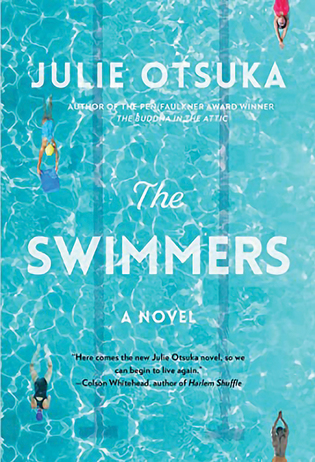
The Swimmers
Julie Otsuka ’84
Knopf, $23
Reviewed by Debra Spark ’84
Using extended metaphor, syntactical repetition, and lists, Otsuka’s newest novel reads more like an extended prose poem than a traditional narrative. The formally inventive The Swimmers tells the story of Alice—a retired lab technician, lap swimmer, and eventual dementia patient—and the writer-daughter who grieves her descent. But this summary understates the slim novel’s ambitions, which are more mythic than personal.
Initially narrated in the communal voice of lap swimmers, the book’s opening focuses on an underground pool, itself a metaphor for any of a number of possible things: society, the planet, a brain, a life. When the pool develops a crack, the literal fracture also suggests the many forces that might damage a cohesive whole.
After the pool’s closure, Alice becomes the novel’s center, with her backstory (as understood by her daughter) presented in terms of what Alice remembers, and what she forgets, including her time in a Japanese American internment camp.
Then a second communal narrator arrives—in the form of the administrators of a memory care center—to describe facility rules to Alice. This voice is concomitantly harsh, practical, knowledgeable, and totalitarian. Thankfully, the writer-daughter commands the story for the concluding pages, describing (with considerably more empathy) the final years of Alice’s life. Though Alice’s circumstances don’t improve, both reader and daughter reach the end of the lane with the faint sense that Alice still has something more to offer, a hope by turns devastating and sustaining, as hope in impossible times can be.
 loading
loading